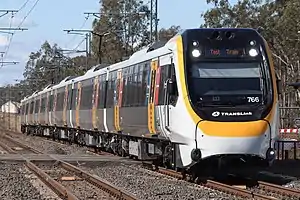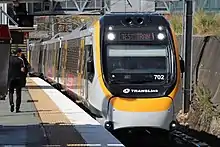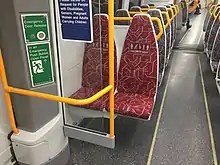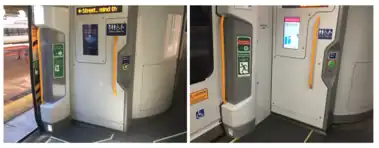| New Generation Rollingstock | |
|---|---|
 NGR 766 at Karrabin station in July 2019 | |
 Interior of an NGR | |
| In service | 2017–present |
| Manufacturer | Bombardier Transportation |
| Built at | Savli, Gujarat, India |
| Replaced | Electric multiple unit InterCity Express |
| Constructed | 2015–2019 |
| Entered service | December 2017 |
| Refurbished | 2019–2024 (accessibility upgrades) |
| Number built | 75 |
| Number in service | 75 |
| Formation | 6-car sets |
| Fleet numbers | 701–775 |
| Capacity | 964. Including 510 standing and 454 seating. |
| Operators | Queensland Rail |
| Depots | Wulkuraka |
| Lines served | All except Ferny Grove, Rosewood and Beenleigh |
| Specifications | |
| Train length | 146.17 m (479 ft 7 in)[1] |
| Car length |
|
| Width | 2,746 mm (9 ft 0.1 in) (including doors) |
| Maximum speed | 140 km/h (87 mph) |
| Traction system | IGBT–VVVF (Bombardier MITRAC) |
| Traction motors | 3-phase AC induction motor |
| Electric system(s) | 25 kV 50 Hz AC (nominal) from overhead catenary |
| Current collector(s) | Pantograph |
| UIC classification | Bo′Bo′+2′2′+Bo′Bo′+Bo′Bo′+2′2′+Bo′Bo′ |
| Bogies | Bombardier FLEXX |
| Safety system(s) | Automatic Warning System European Train Control System |
| Coupling system | Dellner[2] |
| Track gauge | 1,067 mm (3 ft 6 in) |
The New Generation Rollingstock (NGR) is a class of individually-propelled carriages ("electric multiple units") manufactured by Bombardier Transportation in Savli, India for the Queensland Rail City network that entered service between December 2017 and December 2019. They are Queensland Rail's largest fleet of electric trains.
History



In January 2014, the Queensland Government awarded a contract for 75 six-carriage electric multiple units to the Qtectic consortium of Aberdeen Asset Management, Bombardier Transportation, Itochu and John Laing under a 32-year public private partnership.[3][4][5][6] They are the first QR electric multiple units manufactured overseas instead of in Maryborough by Downer Rail (formerly Walkers).[7]
The NGRs were built in Savli, India.[8][9] The design is completely new, and the trains are fitted with nose cones to resemble the existing Electric Tilt Trains for improved aerodynamic performance as opposed to the exposed Scharfenberg couplers used by the existing fleet.[9] The body style differs using flat steel panels on the sides, while retaining corrugated panels for the rooftop. The first arrived at the Port of Brisbane in February 2016.[10][11][12]
The first three entered service on 11 December 2017 on the Airport and Gold Coast lines.[8][13][14][15] By the time of the Commonwealth Games in April 2018, eight had entered service.[16]
The trains received media controversy over a series of issues such as the toilet module size falling short by 12 mm (0.47 in), and inability for wheelchair to access the toilet from one of the two accessible cars.
Because of the NGRs' non-compliance with disability legislation, all platforms they serve are required to be staffed. Initially confined to the Airport and Gold Coast lines, in May 2018 they began operating on the Doomben line, followed by Roma Street to Northgate services in July and Redcliffe and Springfield line services in September.[17] In October 2018, they began operating on the Ipswich and Caboolture lines. In February 2019, they began to operate to Shorncliffe and Cleveland. The same month, the NGRs became the largest fleet of electric trains in Queensland.[18][19][20] In March 2020 they commenced operating on the Sunshine Coast line to Nambour.[21][22]
As of March 2020, they operate passenger services across the City network except for the Sunshine Coast line north of Nambour, Beenleigh, Ferny Grove and Rosewood lines.[21][23][24]
NGRs will not operate on Sunshine Coast line services north of Nambour until signalling upgrades to Gympie North have been completed. Currently trains are required to compatible with the operation of Automatic Train Protection which isn't fitted on the NGRs.[25][26] The last NGR, unit 775, entered service in January 2020.[27][28]
Operation
The NGRs are maintained at a purpose built depot to the west of Wulkuraka station.[29][30][31] Once modifications are complete, the new trains will allow all of the Electric Multiple Unit fleet and InterCity Express sets to be withdrawn. The trains increase the size of the fleet by 26%. The NGRs feature high-backed seats, safety straps for bike storage, luggage space underneath the seats unlike the Interurban Multiple Units that have luggage racks, mobility toilet with baby changing table, free public WiFi and CCTV.[32]
Each NGR unit comprises two driving motor cars (prefixes 3 and 8) at each end, coupled to two trailer cars (prefixes 4 and 7) and two intermediate motor cars in the middle (prefixes 5 and 6, with Motor car B currently featuring the toilet module on original trains and both on upgraded trains).
As they are permanently coupled six-car units, passengers are able to walk the entire length of the train, consequently eliminating the need to couple with another unit. Guards travel at the rear as opposed to the middle with the existing fleet, where two three-car units couple to form a six-car unit. Utilising the same traction equipment based on Bombardier Aventras as well as being compatible with the European Train Control System, the NGR, along with upgraded SMU 260 trains, will be the only trains permitted to travel in the Cross River Rail tunnels.
NGR units are also noted to have contain Gangway connection doors but are almost never used. PIS screens on the platform shows an NGR Icon for that service if the service is being operated by an NGR train.
Accessibility improvements
Work to rectify the non-compliant parts of the trains was performed by Downer Rail's Maryborough facility.[33] After an exemption application to the Australian Human Rights Commission was rejected, the need for rectification was clear.[34] It was determined that the position of the boarding ramps next to the train door was the reason for the toilet module not meeting DDA’s minimum size requirements. The first arrived at Maryborough for rectification work in January 2019. As of mid December 2023, 56 units (703 - 714, 717 - 719, 721, 724, 726, 727, 729 - 738, 740 - 742, 744 - 746, 748 - 754, 756, 758 - 769, and 773) have been completed, approximately 75% of the total NGR fleet. The project is scheduled for completion in 2024.[35][36]

The rectification work solves the disability access problem by providing a toilet module for both centre (wheelchair accessible) cars.[37] This means that wheelchairs no longer have to travel around the toilets to access them from behind.[37] No major changes were made to the general seating other than recovering some of the seats with priority labelling including some transverse seats with high backs and no arm rests.[37]
More help points were added in the space between the two toilet modules.[37]
The toilet modules were made disability compliant by moving the toilet front side and door at least 12 mm (0.47 in) closer to the external doors, while leaving the toilet bowl in the original location.[37] Labelling and other minor changes were made in the toilet module as well, such as the installation of lights that warn in the event of an evacuation.[37]
These trains can be easily identified by the large priority stickers on the windows all along the train. More stickers are present within the train as well.
Some changes were made to signage throughout the train on the advice of disability groups; purportedly as "better wording" but the differences would be minor to the average person - intended instead for the minority of people with literacy difficulties (see difference between green emergency door release wording above).
References
- 1 2 "Queensland New Generation Rollingstock (NGR), Australia". Bombardier. Archived from the original on 26 November 2017. Retrieved 13 July 2022.
- ↑ "Dellner Australia's Footprint" (PDF). Dellner. p. 11. Archived (PDF) from the original on 19 March 2023. Retrieved 20 March 2023.
- ↑ Bombardier Consortium Wins Multi-billion Contract for Queensland New Generation Rollingstock Project Archived 12 May 2015 at the Wayback Machine Bombardier 29 January 2014
- ↑ Bombardier NRG Consortium wins $4.4bn contract for Queensland New Generation Rollingstock Project Archived 21 June 2018 at the Wayback Machine Urbanalyst 4 February 2014
- ↑ "Bombardier-led consortium is Queensland New Generation Rollingstock contract winner" Railway Digest February 2014 page 6
- ↑ Our Equity Partners Archived 21 June 2018 at the Wayback Machine Qtectic
- ↑ Train Dilemma: They should've been made in Maryborough Archived 21 June 2018 at the Wayback Machine Fraser Coast Chronicle 3 March 2017
- 1 2 New Generation Rollingstock Archived 5 November 2014 at the Wayback Machine Department of Transport & Main Roads
- 1 2 "Queensland NGR EMU cars shipped from Mumbai". Railway Gazette International. 1 February 2016. Archived from the original on 18 February 2019. Retrieved 1 February 2016.
- ↑ Queensland's new EMUs land in Brisbane Archived 11 October 2017 at the Wayback Machine International Railway Journal 17 February 2016
- ↑ "First Queensland New Generation Rollingstock EMU arrives in Brisbane, maintenance centre officially opened" Railway Digest April 2016 page 30
- ↑ "Queensland's new trains start to arrive" Track & Signal April 2016 page 39
- ↑ Queensland Rail. "New trains to first service the Airport and Gold Coast". Archived from the original on 21 June 2018. Retrieved 3 October 2017.
- ↑ Rollout of QR's problem trains delayed to before the Games Archived 21 June 2018 at the Wayback Machine Brisbane Times 28 June 2017
- ↑ "New Generation Rollingstock". translink.com.au. Archived from the original on 6 December 2017. Retrieved 6 December 2017.
- ↑ "Timetabling for the Commonwealth Games" Railway Digest June 2018 page 28
- ↑ NGR trains begin service on Springfield and Redcliffe Peninsula lines Railway Digest November 2018 page 18
- ↑ Johnson, Hayden. "Queensland Rail deploys NGR train to cope with Ipswich line". Queensland Times. Archived from the original on 22 October 2018. Retrieved 22 October 2018.
- ↑ New Generation Rollingstock to roll out to Springfield and Redcliffe Peninsula Lines Queensland Rail 27 August 2018
- ↑ "Queensland Government announces New Generation Rollingstock Inquiry" Railway Digest September 2018 page 21
- 1 2 "Extra services for SEQ - March 2020". Queensland Rail. February 2020. Archived from the original on 8 March 2020. Retrieved 5 February 2020.
- ↑ Pearce, Connor (February 2020). "NGR to run on North Coast line for first time". Rail Express. Archived from the original on 29 February 2020. Retrieved 6 February 2020.
- ↑ "First NGR set travels to Maryborough for disabled persons' access modifications" (PDF). Railway Digest. March 2019. p. 20. Archived (PDF) from the original on 26 July 2019. Retrieved 26 July 2019.
- ↑ ""About the NGR trains"". Department of Transport and Main Roads. August 2019. Archived from the original on 5 September 2019. Retrieved 29 August 2019.
- ↑ ""Questions on Notice - No. 1781" (PDF). Queensland Parliament. October 2019. Archived (PDF) from the original on 8 December 2019. Retrieved 8 December 2019.
- ↑ "2017-2018 Annual Performance Report" (PDF). Queensland Rail. Archived (PDF) from the original on 8 December 2019. Retrieved 8 December 2019.
- ↑ Final train in NGR fleet enters service Rail Express 29 January 2020
- ↑ News Railway Digest February 2020 page 17
- ↑ New Generation Rollingstock - Wulkuraka Archived 29 December 2014 at the Wayback Machine Queensland Rail
- ↑ "Work commences on Wulkuraka NGR maintenance centre" Railway Digest June 2014 page 14
- ↑ Queensland NGR maintenance depot completed Archived 10 August 2020 at the Wayback Machine Railway Gazette International 12 February 2016
- ↑ "New Generation Rollingstock trains enter service" Railway Digest January 2018 page 16
- ↑ Labor $150m promise to get Qld trains back on track Archived 24 June 2018 at the Wayback Machine Sunshine Coast Daily 9 November 2017
- ↑ Crockford, Toby (29 March 2018). "Human rights exemption for new trains rejected, leaving door open for legal action". Brisbane Times. Archived from the original on 24 May 2019. Retrieved 8 April 2018.
- ↑ First NGR arrives at Maryborough for rectification works Archived 6 March 2019 at the Wayback Machine Rail Express 31 January 2019
- ↑ New Generation Rollingstock accessibility modification contract awarded Railway Digest June 2019 page 5
- 1 2 3 4 5 6 Clark, Simon (16 August 2021). "NGR rectification photos". Personal. Archived from the original on 16 August 2021. Retrieved 16 August 2021.
External links
![]() Media related to New Generation Rollingstock at Wikimedia Commons
Media related to New Generation Rollingstock at Wikimedia Commons